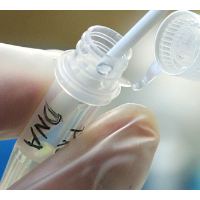Federal Appeals Court Lets State Collect DNA in Felony Arrests

Elizabeth Haskell of Oakland was wrong when she resisted letting the police swab her mouth for DNA and store it in a computer after she was arrested during an anti-Iraq War protest in 2009.
The U.S. Ninth Circuit Court of Appeals ruled 11-0 that being accused of a felony, although not convicted of any crime, was sufficient reason for law enforcement to force someone to surrender their bodily fluids and that California’s law gave them the power.
The decision was not unexpected and the unsigned opinion brusquely tossed aside arguments to the contrary. The Ninth Circuit said the matter was settled by the U.S. Supreme Court in Maryland v. King last year and there was no substantial difference between the two cases.
The American Civil Liberties Union (ACLU), which represented Haskell, disagreed. The Maryland law applies only to those charged with serious felonies and swabbing has to be approved by a judge. The sample is automatically destroyed if there is no conviction.
In California, the felony can be alleged and not charged, it need not be serious and a judge’s approval is not necessary. The sample is not automatically destroyed and won’t be until the detainee formally asks and receives approval.
None of that mattered. The heart of the Supreme Court’s decision was that DNA was no different than fingerprints, it could be obtained during booking and there was already plenty of case law that applied. Opponents of that reasoning argue that DNA sampling is not just a technological progression from fingerprinting; DNA are genetic blueprints that hold far more data and can be used, and misused, in myriad ways that fingerprints can’t.
According to the Federal Bureau of Investigation (FBI), California’s DNA database has more than 1.4 million offenders on record and 496,872 arrestees, and is growing at the rate of 11,000 samples a month, thanks in large part to arrestee submissions.
Data is shared with local and federal authorities, including the FBI, which operates the Combined DNA Index System (CODIS). The federal database contains 9.81 million offenders and 1.18 million arrestees, and is growing at an accelerating rate. It is often featured in popular television crime shows, including Law & Order, Criminal Minds, CSI, Bones, Numb3rs and Dexter.
The California law, which took effect in 2009, was challenged almost immediately. The ACLU filed a request for a preliminary injunction in October of that year, but a couple months later lost Haskell v. Brown in U.S District Court. (The case has since been renamed Haskell v. Harris.)
The ACLU got class-action certification for its lawsuit, beat back the government’s attempt to have the case tossed and proceeded to lose a split decision in February 2012 before a three-judge panel of the Ninth Circuit Court. The ACLU appealed the panel’s decision to the appellate court’s full compliment of 11 judges and had a hearing last year, but then had to wait until the Supreme Court weighed in on King.
The appellate court hinted that if the lawsuit were scaled back they might prevail and the ACLU indicated it would appeal. The Obama administration and California Attorney General Kamala Harris supported the California law.
–Ken Broder
To Learn More:
California DNA Collection Law Upheld (by Howard Mintz, San Jose Mercury News)
Court Upholds California DNA Swabs of Arrestees (by Paul Elias, Associated Press)
Appeal over California DNA Law Finally Kaput (by Tim Hull, Courthouse News Service)
California May Collect DNA in Felony Arrests, Appeals Court Rules (by Maura Dolan, Los Angeles Times)
Lawsuit Tries to Keep Uncharged and Unconvicted Arrestees out of DNA Database (by Ken Broder, AllGov California)
- Top Stories
- Controversies
- Where is the Money Going?
- California and the Nation
- Appointments and Resignations
- Unusual News
- Latest News
- California Forbids U.S. Immigration Agents from Pretending to be Police
- California Lawmakers Urged to Strip “Self-Dealing” Tax Board of Its Duties
- Big Oil’s Grip on California
- Santa Cruz Police See Homeland Security Betrayal in Use of Gang Roundup as Cover for Immigration Raid
- Oil Companies Face Deadline to Stop Polluting California Groundwater





